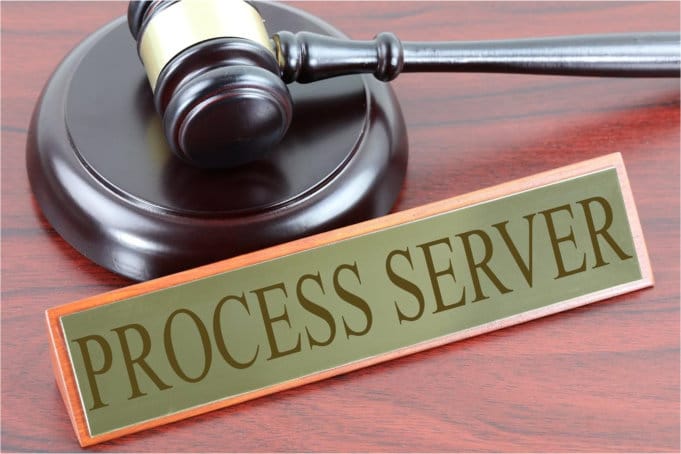Process Serving: Key Tips to Guarantee Lawful Notifications Are Delivered Appropriately
Process Serving: Key Tips to Guarantee Lawful Notifications Are Delivered Appropriately
Blog Article
Recognizing the Value of Refine Serving in Legal Procedures
Refine serving is a basic element of lawful procedures that makes certain all parties are informed of their legal rights and commitments. The subtleties of reliable procedure serving extend past mere delivery; they include lawful requirements and possible effects of incorrect service.
Meaning of Process Offering
Process serving is an essential element of the lawful system, defined as the official shipment of legal records to people involved in a litigation. This process guarantees that all parties are appropriately informed of lawsuits being taken versus them or to which they are an event. Usually, these records include summons, grievances, subpoenas, and other court-related documents that need the recipient's focus and reaction.
The value of process offering lies in its duty in upholding the principles of due process. It guarantees that people have notice of lawful proceedings, thus offering them a chance to respond or defend themselves. Proper solution of process is not simply a procedural formality; it is a basic aspect of making sure justness and openness in the judicial system.
Refine serving can be conducted by different people, consisting of expert process web servers, police policemans, and even lawyers, depending upon administrative guidelines. Each method of solution has its very own standards and techniques, which are crucial to stop delays or dismissals within the legal framework. Comprehending the interpretation and feature of process serving is essential for all stakeholders involved in legal procedures.

Legal Demands for Process Serving
Lawful demands for procedure offering are important to make sure that the distribution of legal papers complies with developed protocols and is acknowledged by the court. Each jurisdiction has specific regulations governing how and when records need to be served, which might consist of summonses, subpoenas, and complaints.
Generally, process-server must be neutral 3rd parties that are not associated with the instance. They should also comply with state regulations pertaining to service approaches, which can include individual solution, substitute service, or service by mail. Personal solution includes supplying documents straight to the recipient, while substitute solution enables for shipment to another liable individual at the recipient's home or business.
Furthermore, process servers are generally called for to submit a proof of service, a lawful paper that confirms the shipment of documents, with the court. This record consists of information such as the date, time, and technique of service, in addition to the name of the individual served.

Duty in the Justice System
An essential element of the justice system, procedure offering makes certain that individuals associated with lawful proceedings are correctly informed of actions taken versus them (Process Serving). This formal alert is essential for promoting the concepts of due procedure, which mandates that events have the opportunity to reply to cases made against them. Without efficient procedure serving, the legal system would certainly be rendered inadequate, as people might take part in actions without understanding of pending legal issues
Process-server serve a crucial duty in protecting the stability of the lawful process. They function as neutral celebrations, delivering legal files such as summons, issues, and subpoenas, thus cultivating transparency and liability within the Visit Your URL judicial framework. By guaranteeing that all events are educated, process offering helps to avoid any kind of this contact form prospective unjust benefit, allowing for fair involvement in lawful procedures.
Additionally, the professionalism and reliability of process-server adds to the general public's trust in the justice system. Their adherence to ethical practices and lawful requirements strengthens the legitimacy of the judicial procedure. Inevitably, efficient process offering is crucial in promoting the rule of regulation and guaranteeing that justice is accessible to all people involved in lawful disputes.
Repercussions of Improper Solution
The repercussions of inappropriate solution can significantly weaken the honesty of legal process. When an event is not served correctly, it can cause a host of difficulties, including hold-ups in the case timeline and enhanced lawful prices. Incorrect service can cause the offender not knowing the lawsuit against them, which may stop them from reacting properly or offering their protection. This absence of notice can ultimately lead to default judgments, where the court guidelines in favor of the plaintiff without listening to the defendant's side.
Moreover, inappropriate solution can make court orders and judgments void, forcing the complainant to see restart the procedure, which can be both monetarily burdensome and time-consuming. It can likewise open up the door to appeals and difficulties, as the accused might argue that they were not correctly notified of the proceedings, complicating the legal landscape further.
Ideal Practices for Effective Service

2nd, timing plays a vital function. Offering files immediately can avoid hold-ups in legal process and make certain that all events are alerted in a timely fashion. In addition, employing an expert process server can enhance efficiency, as they are educated to navigate potential difficulties and guarantee conformity with neighborhood legislations.
Third, maintaining accurate documents of the service process is necessary. Recording the date, time, and fashion of service can give crucial evidence if disagreements occur concerning whether solution was properly carried out.
Verdict
To conclude, process offering is a necessary part of legal treatments, making sure that all events are duly informed and paid for the chance to respond. Sticking to lawful requirements and ideal methods not only promotes the principles of due process but likewise reinforces the honesty of the justice system. The repercussions of inappropriate solution can result in substantial hold-ups and difficulties, highlighting the requirement for effective process serving in advertising fairness and ease of access in lawful disputes.
The subtleties of efficient process serving prolong beyond simple distribution; they include lawful requirements and possible effects of inappropriate service.Process offering is an essential part of the legal system, specified as the formal distribution of legal files to individuals entailed in a court situation. Without reliable procedure serving, the lawful system would be rendered ineffective, as individuals can involve in activities without recognition of pending lawful matters.
Refine servers offer a crucial duty in protecting the honesty of the lawful process - Process Serving. The repercussions of inappropriate service can lead to significant hold-ups and difficulties, highlighting the need for effective procedure offering in promoting justness and accessibility in lawful disagreements
Report this page